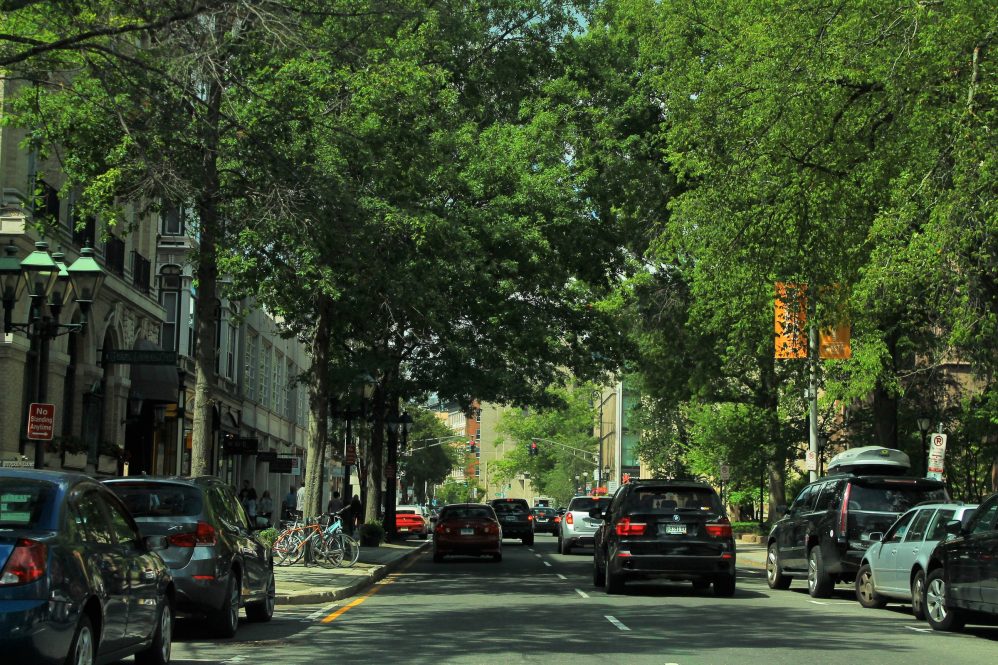The Department of Natural Resources and the Environment at the University of Connecticut will lead research and training components of the recently announced Urban Forest Equity and Resilience Grant Program from the Connecticut Department of Energy and Environmental Protection (CT DEEP).
CT DEEP, the Connecticut Urban Forest Council, the Department of Natural Resources and the Environment in the College of Agriculture, Health and Natural Resources, and the Center for Environmental Sciences and Engineering at UConn have launched an initiative to promote equity and resilience in Connecticut’s urban forests and support non-profit organizations and municipalities in Connecticut’s urban areas.
Urban areas and those who live in them are particularly vulnerable to the impacts of climate change, including extreme heat. According to a recent study by researchers at the Nature Conservancy, 92% of low-income blocks in the U.S. have less tree cover and hotter average temperatures than high-income blocks. Five of the 10 worst discrepancies in the US were found in Connecticut. Low income and communities of color with low urban tree cover are among the most vulnerable populations to climate change and its impacts.
George F. Cloutier Professor in Forestry Robert Fahey will lead the research effort investigating urban forest equity and resilience. Fahey and his team will examine the socioecological systems at work in and around urban forests. The project will support a postdoctoral fellow who will conduct cutting-edge research on this topic.
This research will also help inform management and outreach interventions by determining if resources would be best used to increase messaging and promotion of urban forest areas, or if these forests need to be managed to be more accessible and desirable for the community.
This program’s focus on environmental justice also aims to foster diversity in urban forestry, and the effort is part of CAHNR’s larger commitment to diversity and environmental justice.
“There needs to be an effort at multiple levels to start fostering diversity in the people working on these questions,” Fahey says.
Fahey intends to establish a longer-term monitoring network for conditions of and access to urban forests.
“Having a long-term monitoring program is especially important for urban forests because they can take time to change, but can also change quickly following disturbances,” Fahey says. “Having the baseline network can be extremely important.”
In addition to research, UConn graduate research assistants will also provide technical assistance to grant awardees as part of the training and outreach mission of the program. Based on the nature of the projects, the students conducting this work may help with technologies such as geographic information systems (GIS) mapping and other spatial data, data collection, and monitoring program outcomes.
Associate extension professor Thomas Worthley will provide training support for this project, as well as assisting with any public education elements of the grants.
Worthley emphasizes that the work completed in the community through these grants should extend well beyond the two-year window for the project.
“It’s a community commitment,” Worthley says. “While people may come and go, neighborhoods will develop a long-term commitment to these projects.”
Urban Forest Equity and Resilience Grants will be funded through Regional Green House Gas Initiative (RGGI) Auction proceeds. These projects will seek to address environmental justice and tree equity concerns throughout Connecticut. The projects will focus on five areas: urban forestry, climate change, environmental justice and equity, and community involvement.
RGGI is a cooperative effort among the states of Connecticut, Delaware, Maine, Maryland, Massachusetts, New Hampshire, New York, Rhode Island, and Vermont (RGGI states) to cap and reduce power sector CO2 emissions. RGGI is the nation’s first mandatory, market-based CO2 emissions reduction program.
Visit the CT DEEP website for more information on the grant program, including criteria and how to apply.



